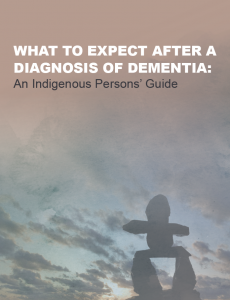Fact sheet from the Indigenous Cognition & Aging Awareness Research Exchange (I-CAARE.ca) in Canada based on research with Canadian indigenous communities.
Each factsheet has a blank space to add your own organization’s contact information. Factsheets have pages in multiples of four so they can be printed on regular paper or as a booklet.
What to Expect after a Diagnosis of Dementia: An Indigenous Person’s Guide
Fact Sheet Excerpt
For people with a diagnosis of dementia…
A diagnosis of dementia can be scary. Sometimes people diagnosed with dementia do not accept it at first. Many older people believe that changes to the mind come naturally with age and their journey through life. While some memory changes can be expected as you age, dementia as a disease will change your memory and concentration more quickly. For this reason, it is important to start talking about it now with your loved ones and others who will support you.
We have created this Indigenous Person’s guide to help you understand your diagnosis and the path ahead. Indigenous peoples who have had dementia in their own families made these suggestions:

• Learn about the different types of dementia – they may have different symptoms
• Find resources that tell you about the progression of dementia and make sure you know what to expect at each stage. Dementia can act slow or fast in different cases. Make sure you are planning ahead
• Think of the people who will help support you when you need it, such as family, friends, community members or health care workers
• Think about who you will ask to make decisions for you when you need them to. It is best to think about these legal issues when you are first diagnosed
• Find community supports such as the local health centre programs or staff, home and community care programs or your local Alzheimer’s Society
• If you are still driving you will need to think about how you will eventually stop and work with the local programs, friends and family to find other ways to get around
• Pay attention to your physical health by eating well, being active and taking care of other illnesses you might have like diabetes or high blood pressure
• Stay connected with people and be social
• Set up regular appointments with your health care providers to check in on the dementia and any new care needs that arise – for example, you may need more home care or medical equipment in your home
• Consider taking family members to your medical appointments and information sessions so they can learn how best to help you
• Consider wearing a medical I.D. bracelet
• Keep track of what tasks are frustrating or upsetting and ask for support to complete them
• Keep calendars, journals or lists. Sticky notes on mirrors and refrigerators can help
• Formal medical care is not the only way to deal with dementia. Other techniques Indigenous people use include prayer, ceremony, church, meditation, yoga, visiting with youth, art-therapy, story-telling, speaking the language and humour
• Connect with a doctor you trust and visit regularly and tell them about
For caregivers…
There is much to consider following a diagnosis of dementia. Your role as a support person or caregiver is very important. Caregiving can be challenging but many Indigenous caregivers stories also show that they have found the role rewarding in many ways. Some found it a way to reconnect with loved one and as an opportunity to learn about them and their life in a new way. Caring for a loved one with dementia is demanding on your mind, emotions, body and spiritual self. Some Indigenous caregivers find that they lose sleep, worry often, become frustrated with their loved one and find it tough to balance work, caregiving and their own lives.
Click to read more from the full factsheet.
© Indigenous Cognition & Aging Awareness Research Exchange. Kristen Jacklin, Wayne Warry, Melissa Blind, Louise Jones, Sharlene Webkamigad. “What to expect after a diagnosis of dementia: an Indigenous person’s guide” (1138628, Industry Canada). Retrieved from: https://www.i-caare.ca/factsheets.
